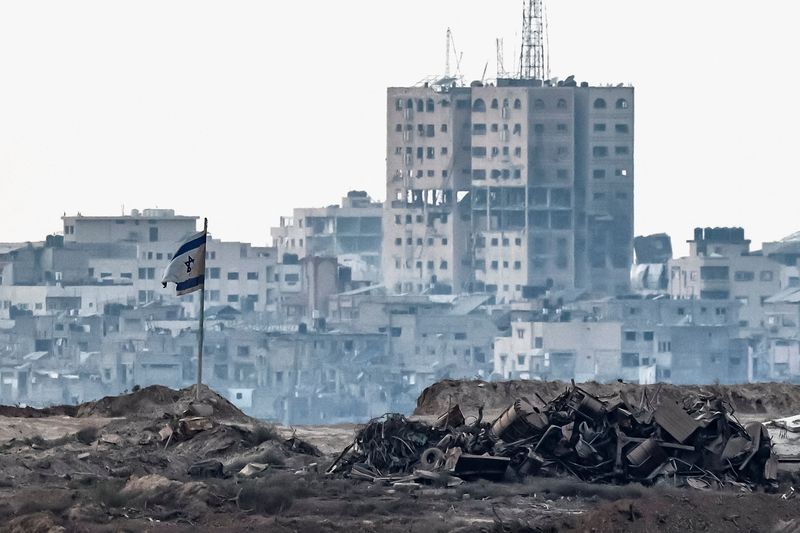Israel approves plan to take control of Gaza City

By Alexander Cornwell, Nidal al-Mughrabi and Charlotte Greenfield
JERUSALEM/CAIRO (Reuters) -Israel’s political-security cabinet approved a plan early on Friday to take control of Gaza City, as the country expands its military operations despite intensifying criticism at home and abroad over the devastating almost two-year-old war.
“The IDF will prepare to take control of Gaza City while providing humanitarian aid to the civilian population outside the combat zones,” Prime Minister Benjamin Netanyahu’s office said in a statement, referring to the Israeli Defence Forces.
While Netanyahu said on Thursday Israel intended to take military control of the entire Gaza Strip, the plan approved on Friday focused specifically on Gaza City, the largest city in the enclave, located in its north.
Axios reporter Barak Ravid, citing an Israeli official, said on X the plan involved evacuating Palestinian civilians from Gaza City and launching a ground offensive there.
Asked if Israel would take over the entire coastal territory, Netanyahu told Fox News Channel’s Bill Hemmer in an interview on Thursday: “We intend to.”
But he said Israel wanted to hand over the territory to Arab forces that would govern it. He did not elaborate on the governance arrangements or which Arab countries could be involved.
“We don’t want to keep it. We want to have a security perimeter. We don’t want to govern it. We don’t want to be there as a governing body,” he said.
Israeli officials described a previous meeting this week with the head of the military as tense, saying military chief Eyal Zamir had pushed back on expanding Israel’s campaign.
Among the scenarios being considered ahead of the security meeting was a phased takeover of areas in Gaza not yet under military control, one government source said, speaking on condition of anonymity.
Evacuation warnings could be issued to Palestinians in specific areas of Gaza, potentially giving them several weeks before the military moves in, the person added.
In its Friday statement, Netanyahu’s office said the vast majority of the political-security cabinet members believed that “the alternative plan presented in the cabinet would not achieve the defeat of Hamas nor the return of the hostages.”
Two government sources said any resolution by the security cabinet would need to be approved by the full cabinet, which may not meet until Sunday.
‘BLATANT COUP’
Total control of the territory would reverse a 2005 decision by Israel by which it withdrew Israeli citizens and soldiers from Gaza, while retaining control over its borders, airspace and utilities.
Right-wing parties blame that withdrawal decision for the militant Palestinian group Hamas gaining power there in a 2006 election.
It was unclear whether Netanyahu was foreseeing a prolonged takeover or a short-term operation. Israel has repeatedly said it aims to dismantle Hamas and free Israeli hostages.
Hamas in a statement called Netanyahu’s comments “a blatant coup” against the negotiation process.
“Netanyahu’s plans to expand the aggression confirm beyond any doubt that he seeks to get rid of his captives and sacrifice them,” the statement said.
Arab countries would “only support what Palestinians agree and decide on,” a Jordanian official source told Reuters, adding that security in Gaza should be handled through “legitimate Palestinian institutions.”
Hamas official Osama Hamdan told Al Jazeera the group would treat any force formed to govern Gaza as an “occupying” force linked to Israel.
Earlier this year, Israel and the United States rejected an Egyptian proposal, backed by Arab leaders, that envisaged the creation of an administrative committee of independent, professional Palestinian technocrats entrusted with the governance of Gaza after the war.
Opinion polls show most Israelis want the war to end in a deal that would see the release of the remaining hostages.
The White House had no immediate comment. President Donald Trump has declined to say whether he supported or opposed a potential full military takeover of Gaza by Israel.
Netanyahu’s government has insisted on total victory over Hamas, which ignited the war when it staged a deadly October 2023 attack on Israel from Gaza.
The U.N. has called reports about a possible expansion of Israel’s military operations in Gaza “deeply alarming” if true.
The idea, pushed especially by far-right ministers in Netanyahu’s coalition, of Israeli forces moving into areas they do not already hold in the enclave has also generated alarm in Israel.
REMAINING HOSTAGES
There are 50 hostages still held in Gaza, of whom Israeli officials believe 20 are alive. Most of those freed so far emerged as a result of diplomatic negotiations. Talks toward a ceasefire that could have seen more hostages released collapsed in July.
A senior Palestinian official said Hamas had told Arab mediators an increase in humanitarian aid entering Gaza would lead to a resumption in ceasefire negotiations.
Israeli officials accuse Hamas of seizing aid to hand to its fighters and to sell to finance its operations, accusations the militant group denies.
Videos released last week of two living hostages showed them emaciated and frail, stirring international condemnation.
Recent images of starving children from Gaza have also shocked the world and fuelled international criticism of Israel over the sharply worsening conditions in the enclave.
Hamas, which has ruled Gaza for nearly two decades but now controls only fragmented parts, insists any deal must lead to a permanent end to the war. Israel says the group has no intention of going through with promises to give up power afterwards.
(Reporting by Alexander Cornwell in Jerusalem and Nidal al-Mughrabi in Cairo; Additional reporting by Steven Scheer in Jerusalem, Suleiman Al-Khalidi in Amman, Doina Chiacu and Kanishka Singh in Washington and Hatem Maher in Cairo; Editing by Lincoln Feast, Stephen Coates and Raju Gopalakrishnan)









